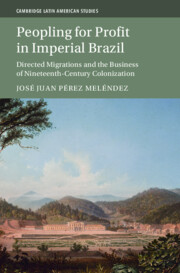‘This is a critical and multi-dimensional study of colonization in the nineteenth century, appearing at a time of renewed mass immigration. Of impressive breadth and nuance, Pérez Meléndez situates regional developments in global terms.’
Celso Thomas Castilho - Vanderbilt University
‘Peopling for Profit exposes the business behind colonization in the foundational years of state-building, economic and technological transformations and attacks on the slave trade and slavery. This masterly researched and gracefully written book reshapes our understanding of the politics and economics behind the massive influx of Europeans in nineteenth-century Brazil, a pivotal change that shapes contemporary Brazil as much as the ending of the transatlantic slave trade and slave emancipation.’
Beatriz Mamigonian - Universidade Federal de Santa Catarina, Brazil
‘A masterly inquiry into the interplay of international migration, the commerce of colonization, and state policy in a context of slavery. It offers an innovative take on the kaleidoscopic peopling of Brazil and broader insights that can take the study of settler colonialism beyond its present Anglocentric confines.’
José C. Moya - Barnard College, Columbia University
‘Pérez Meléndez has marshalled a remarkable amount of evidence to demonstrate that politically connected members of the emerging Brazilian elite built fortunes from a wide variety of colonization schemes in the nineteenth century. Going a step further, he shows how the profit motive shaped ‘directed migration,’ often outweighing other factors to which historians have given much greater attention, thereby challenging many of our longstanding assumptions about postcolonial nation-building projects.’
Barbara Weinstein - New York University
‘… well-written and thoroughly researched … This book is a gem for 'Brazilianists' and scholars of colonization in North America.’
Carlos Haag
Source: Canadian Journal of Latin American and Caribbean Studies
‘In this well-researched and clearly written book, [the author] offers well supported, revisionist analyses about the significance of voluntary migration to Brazil in the nineteenth century. … Peopling for Profit promises to be an essential reference work for advanced students and scholars in the field of imperial Brazil and recommended reading for those interested in the dynamics of global migration.’
Judy Bieber
Source: Hispanic American Historical Review

